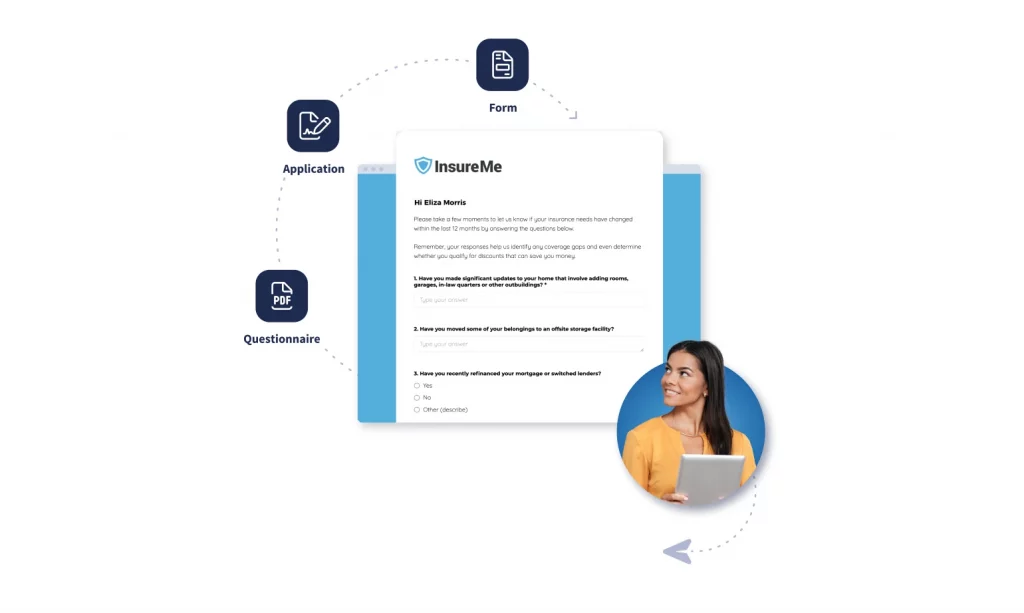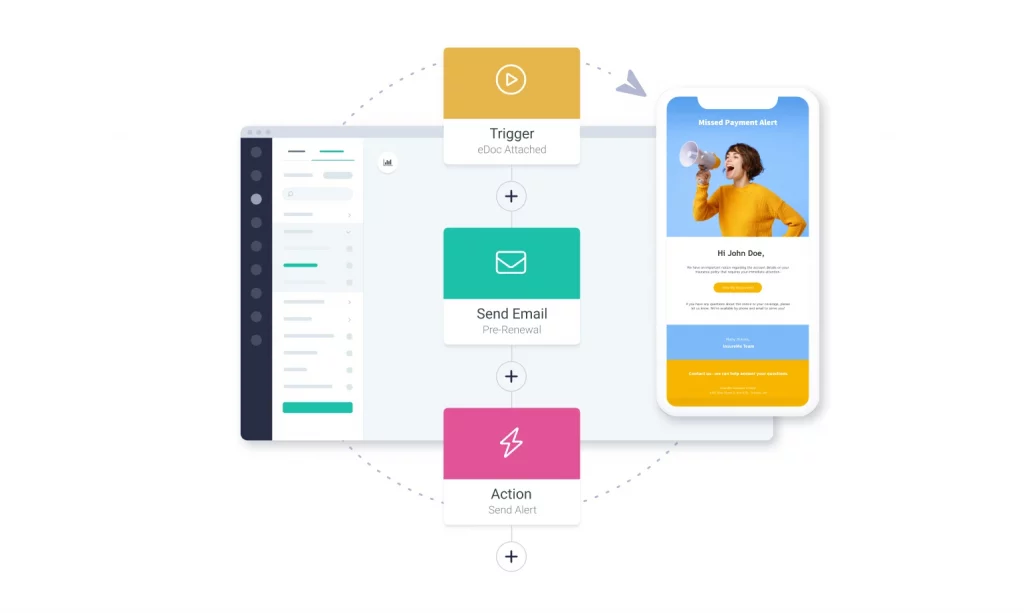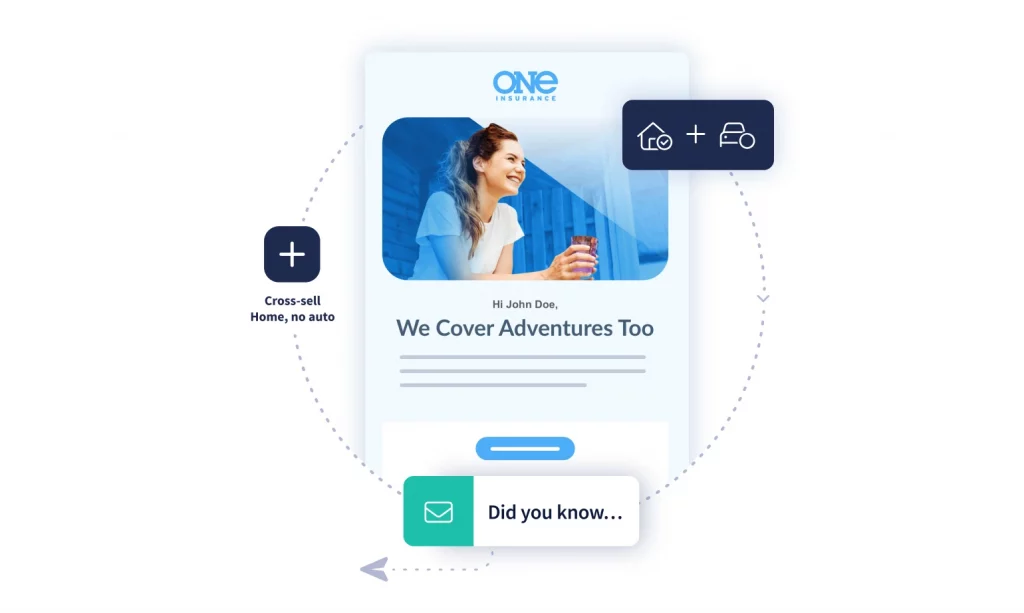How to Tackle Inflation in Your Insurance Agency (Ultimate Guide)
ByPat

Inflation in the United States reached an unprecedented 8.6% in May 2022, the highest rate recorded since 1981. But it’s not the only nation suffering.
Analysis of data from the OECD member nations and other economically significant countries by the Pew Research Center revealed significant increases in annual inflation rates across the globe.
The insurance industry has not been spared by inflation.
The rising costs of daily operation, labor, and living are increasing the costs of claims and business expenses, thus threatening the growth and solvency of insurance agencies in the United States and beyond.
Agencies that want to stay in business and be profitable must take action to manage the impact of inflation on their operations.
This article will cover how inflation is affecting the insurance industry and what your agency can do to tackle inflation and improve your bottom line.
TL;DR
- The insurance industry is experiencing unusually high claims losses due to the increased cost of replacing damaged items brought about by the record-breaking inflation rates.
- Insurance carriers are projected to increase premiums, and agencies will place hiring on hold. Customers will likely cancel non-compulsory insurance and shop for cheaper coverage in a bid to cut costs.
- Automation and digital technologies are the present and future for independent agents who want to stay lean while providing best-in-class service and a memorable experience.
How inflation has impacted the insurance industry
Here are some of the ways insurance companies and agencies are being negatively affected by inflation:
#1. Skyrocketing claims costs
McKinsey estimates that inflation contributed to a $30 billion increase in the amount insurers paid to cover claims in 2021 in the United States alone.
Due to supply chain disruptions, auto parts and equipment prices rose by 22.8% between June 2021 and June 2022 and by over 40% in the last two years. This increases losses by forcing insurers to pay more to settle vehicle damage claims.
Supply chain upheavals are also affecting other commodities and lines of business. For example, the cost of building materials has risen by 30% in two years.
When you combine the recent spike in the frequency and severity of natural disasters with the cost of replacing the properties they ravage, the insurance industry is left with huge losses to bear.
#2. Insurance shopping is slowing down
People are choosing to save money rather than invest in major purchases thanks to exorbitant prices and supply scarcity for homes and automobiles. This also means that fewer people are buying insurance for their homes and cars.
According to the TransUnion Personal Lines Insurance Shopping Report, the number of people shopping for property and auto insurance fell by 3.4% and 12.5%, respectively, in 2022 compared to the previous year.
#3. Catastrophic financial losses
The insurance industry operates on the presumption that insurers can make enough money from premiums and divide risks between plenty of policyholders so that they can easily pay out claims.
But when the price of everything shoots up quickly and inflates, this strategy shatters, leaving insurers in a dire financial situation.
Many insurers didn’t have enough forewarning or time to adjust the price of their premiums to offset the cost of ultra-expensive, large, and frequent claims. So all those extra expenses are coming out of their bottom line.
Agencies have also been forced to adapt to the whims of their insurers.
#4. Falling investment values
Since insurers tend to favor conservative investment strategies and hold a huge chunk of their assets in bonds and stocks, higher inflation could also adversely affect the value of their investments.
This is because income from bond investments, especially those with long maturities, is falling short compared to the growing rate of inflation.
What to expect in the insurance industry in 2023
In the face of current economic realities, both insurance agents and customers will try to find ways to cut costs and tackle inflation. Here are some things you can expect to see in 2023:
Higher prices from your competition
Many insurance agencies will try to pass on the rising costs to their customers by increasing insurance premiums.
They will review their underwriting to account for inflation and make sure what they’re charging for their policies is substantial enough to cover the increased expenses they’re incurring.
Hiring freezes
Even before inflation started surging dramatically, real and nominal wages were trending upward. This is because the gap between open jobs and available talent has fueled the competition for skilled workers.
As inflationary pressures continue to compound, insurance agencies will be less financially equipped to compete for talent in the tight labor market. So they will take a more conservative approach — putting a freeze on hiring until things normalize again.
Customers saving money at all costs
Let’s not forget that inflation is also eating through household purchasing power and the profit margins of other businesses. Customers have less disposable income than before and will do everything in their power to cut costs and redirect their expenses toward necessities.
For many, this will mean switching to cheaper insurance agencies, opting for less comprehensive coverage, canceling discretionary coverage like life, travel, rental, and pet insurance, and taking their chances with fate instead.
Restrictions on marketing and sales budgets
When money is tight, marketing and sales are the first places businesses go to slash running expenses. While this is not a smart approach, you can still expect many businesses to fall into the trap of gutting their marketing and sales efforts when they should take full advantage of them to drive revenue.
How to tackle inflation in your insurance business
For many insurance agencies, their risk management strategy for inflation is throwing tactics at the wall and hoping something works out.
However, only companies that take a measured, well-reasoned approach will ride out the wave and emerge from the other side in a stronger position.
Here are some strategies you can deploy to help your insurance agency effectively combat inflation:
Automate repetitive work so you can dedicate more time to revenue-generating activities
There are lots of processes in the insurance industry that are perfect for automation. If you’re serious about tackling inflation and saving money, you need to invest in a solution that can help you streamline and automate your insurance tasks.
Operations like claims management, document processing, data entry, compliance management, and more can be done by robotics and smart automation software. This way, you can scale your business without bringing in more people to handle the increased workload.
Your existing workforce can also save thousands of hours that they can redirect towards more high-value tasks like selling to customers and keeping them satisfied.
How Pathway can help
Pathway uses automation to help you get more done in less time at only a fraction of the cost.
It helps you to:
- Automatically manage customer relationships
- Process payments
- Turn your insurance documents into easy-to-fill online forms
- Run marketing campaigns to attract and retain customers
- Instantly deliver policy documents.
Want to leverage Pathway’s power of automation to increase process efficiency while saving money and time? Sign up today.

Use auto-renewal reminders
Instead of chasing customers for payments and constantly sending reminders to get them to renew their insurance policies, you can set this workflow to run on its own with Pathway.

Using auto-reminders will help your agency stay lean and highly effective.
Pathway can gently push customers to renew their plans before their insurance is due to expire. Don’t give your customers the opportunity to let their policies lapse! Automate your billing process and encourage customers to sign up for auto-renewal so that their bank account gets charged automatically whenever their current insurance coverage runs out.
This saves them the hassle of having to fill out payment forms and complete the transactions themselves.
Offer monthly and quarterly billing over annual billing
With purse strings tightening and funds unable to stretch as far as they used to, asking your customers to shell out huge lump sums can be a challenge.
They might not be in a good enough financial position to afford to renew their annual coverage without sacrificing another expense.
If, for instance, they are forced to choose between paying for discretionary insurance or affording their rent, mortgage, electricity, or groceries, insurance isn’t likely to win that debate.
The smart way to avoid this outcome and make paying premiums convenient for your customers is to switch from using annual billing cycles to quarterly or monthly billing.
This way, customers can pay in smaller installments that won’t overwhelm their budgets.
Leverage digital technology to cut operating costs
If your insurance company still relies on complex legacy architecture and systems, it’s time to move away from them and embrace modern digital technologies that can streamline your operations.
Unlike legacy systems, new-age technologies — automation, chatbots, predictive analytics, artificial intelligence, distributed infrastructure, and internet of things applications — can offer your insurance brokerages flexibility and resilience.
You can easily scale up or scale down processes depending on your operational capacity or requirements at any given time.
Digital solutions can also help you maximize profits by shortening your claims cycle, providing targeted risk inspection, discovering opportunities to add value, and increasing the accuracy of claims.
Focus on the products that give people peace of mind
All insurance products provide at least some degree of peace of mind, but some types of insurance are more likely to sell well during a period of economic uncertainty.
If someone has to choose between insuring the car they drive to work and the boat they take out on an occasional Sunday afternoon, the car is a pretty obvious choice.
We recommend you think about your customers and the biggest worries they have. For example, renters may be concerned about the cost of replacing phones and computers if their apartment is broken into. Parents might be concerned about what might happen if one of them were to be made redundant and unable to find another job quickly. Landlords might be concerned about tenants breaking their lease and the property sitting empty for months.
Now, more than ever, people are worried about their finances.
So, don’t try to sell people on the extras right now — just focus on insuring the things people need.
4 ways to make your business resilient to inflation
Here are some practical tips you can implement to help your agency stay agile, relevant, profitable, and growth-oriented in the face of high inflation rates:
#1. Invest in ROI-generating marketing channels only
Instead of slashing your marketing budget to bits or suspending promotional efforts until the economy softens again, focus your marketing efforts on the channels that generate the most ROI for your business.
People are still going to be shopping for insurance or looking to change agencies because their needs aren’t being met. You need to be positioned and prepared to capture them.
Here are some resources to help with your marketing efforts:
- 6 Ways To Supercharge Your Email Marketing Campaigns
- Are Insurance Marketing Bots Right for You? 7 Use Cases to Know
- Killing the Boring Insurance Brochure: Reinvent Your Marketing Materials
- 7 Elements Your Insurance Website Needs to Succeed
- A Referral Marketing Guide for Insurance Agencies
- 6 Best Ways to Automate Marketing in Insurance
We also recommend this article from Forbes: Four Marketing Strategies for Riding Out a Consumer Recession.
#2. Re-negotiate outdated contracts
Since the replacement costs for lost or damaged properties are on the rise, chances are these costs will exceed your customers’ current coverage limits.
So if you haven’t done so in the last year or two, it’s time to review customer coverage needs, terms, conditions, and exclusions and offer increased limits that will provide them with sufficient coverage for losses.
If you’re looking for a great guide on the subject, we recommend Why And How To Renegotiate A Contract from Forbes.
#3. Offer more value to customers
Look for ways to meet more of your customers’ needs and wants by cross-selling and upselling other products that are relevant to them.

Customers would rather meet all their needs with a single broker than look at different offerings from multiple providers. So there’s a lot of opportunity for brokers who can offer extra value and great service to customers.
#4. Reduce labor costs with automation
Let automation do the heavy lifting for you when it comes to running and managing your insurance processes and workflows.
Automation solutions will cost you far less to implement than hiring and training insurance agents to handle those same tasks. Not to mention the unmatched accuracy, speed, and efficiency they bring to the table.
Final thoughts: Inflation, insurance, and Pathway
The insurance industry isn’t inflation-proof, but that doesn’t mean your insurance agency is completely powerless to withstand the worst of its impact.
You can still deliver excellent customer experiences, rein in ballooning costs, and maintain long-term growth despite difficult economic conditions.
Pathway is also here to help. Pathway provides a variety of powerful automated solutions to help you:
- Run seamless customer acquisition and nurturing campaigns with Marketing Bot
- Collect customer information through easy-to-use digital forms with Form Builder
- Help clients manage their insurance with Self-Service Kiosk
- Streamline administration tasks, policy documents delivery, renewals, and billing with Office Bot
Schedule a demo to see what Pathway can do for you.
Recent Posts
 Integrated Insurance…February 12, 2026
Integrated Insurance…February 12, 2026 Why Automated Insura…January 19, 2026
Why Automated Insura…January 19, 2026 Insurance Operations…January 15, 2026
Insurance Operations…January 15, 2026
Recent Comments
diş beyazlatma on Top10 Best Triggered Email Marketing Campaigns for Insurance BrokersThanks for sharing, it's…
alexander mcqueen on Top10 Best Triggered Email Marketing Campaigns for Insurance BrokersI would like to point out…
Kristina Crowner on Marketing Automation for Insurance: 6 Best PracticesIts like you read my mind…



Leave a Comment